DeprecationWarning: There is no current event loop [Solved]
Last updated: Apr 11, 2024
Reading time·5 min

# Table of Contents
# DeprecationWarning: There is no current event loop
The message "DeprecationWarning: There is no current event loop" is shown
when you try to call the asyncio.get_event_loop() method when there isn't a
running loop in the current thread.
Here is an example of when the warning is shown.
import asyncio async def func(index): print(f'Before {index}') await asyncio.sleep(0.1) print(f'After {index}...') loop = asyncio.get_event_loop() async def create_tasks_func(): tasks = [] for idx in range(3): tasks.append(asyncio.create_task(func(idx))) await asyncio.wait(tasks) # ⛔️ DeprecationWarning: There is no current event loop loop.run_until_complete(create_tasks_func()) loop.close()
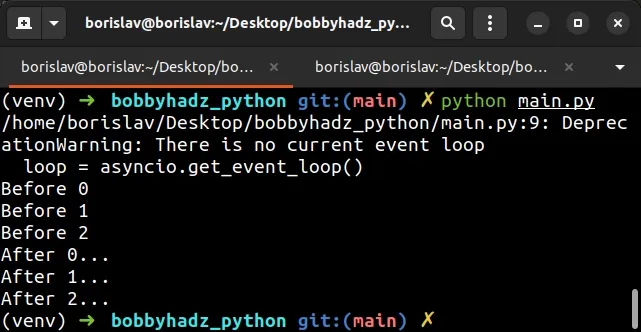
The issue in the code sample is that starting with Python 3.11, an error is
raised if you call asyncio.get_event_loop without a running event loop.
To resolve the issue:
- Use the
asyncio.new_event_loop()method to create and return a new event loop object. - Use the
asyncio.set_event_loop()method to set the current event loop for the current OS thread.
import asyncio async def func(index): print(f'Before {index}') await asyncio.sleep(0.1) print(f'After {index}...') # 1) Create an event loop object ✅ loop = asyncio.new_event_loop() # 2) Set the current event loop for the current OS thread ✅ asyncio.set_event_loop(loop) async def create_tasks_func(): tasks = [] for idx in range(3): tasks.append(asyncio.create_task(func(idx))) await asyncio.wait(tasks) loop.run_until_complete(create_tasks_func()) loop.close()
The following line creates the event loop object.
# 1) Create an event loop object ✅ loop = asyncio.new_event_loop()
And the following line sets the current event loop for the current OS thread.
# 2) Set the current event loop for the current OS thread ✅ asyncio.set_event_loop(loop)
If I run the code sample with python main.py, no warnings are shown.
python main.py
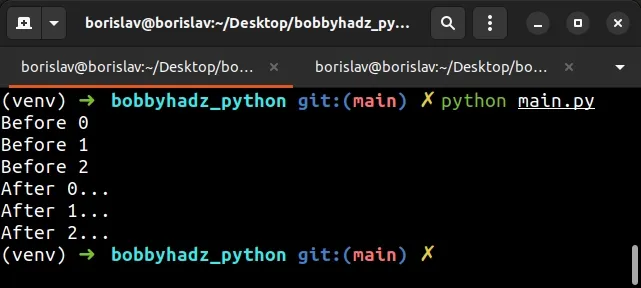
If you need your code to be able to run in Python version < 3.10 and Python >
3.10, use an if/else statement when setting up the event loop.
import sys import asyncio if sys.version_info < (3, 10): loop = asyncio.get_event_loop() else: try: loop = asyncio.get_running_loop() except RuntimeError: loop = asyncio.new_event_loop() asyncio.set_event_loop(loop)
The if statement is run if the current Python version is less than 3.10, so
we use the
asyncio.get_event_loop()
method.
Otherwise, the else block runs.
We try to call the
asyncio.get_running_loop
method and if a RuntimeError is raised, we use the asyncio.new_event_loop()
method.
The last step is to set the current event loop for the current OS thread in the
else block.
# Resolving the warning when using the asyncio.gather() method
You might also get the warning when using the asyncio.gather() method.
Since Python version 3.10, a deprecation warning is shown if:
- no positional arguments are provided
- not all positional arguments are Future-like objects and there is no running event loop
If you got the warning when using gather(), there is no event loop running at
the time you called the gather() method.
Your code will continue to work until you switch to Python version 3.11.
To resolve the issue, await your call to the gather() method from another
coroutine.
import asyncio async def factorial(name, number): f = 1 for i in range(2, number + 1): print(f"Task {name}: Compute factorial({number}), currently i={i}...") await asyncio.sleep(1) f *= i print(f"Task {name}: factorial({number}) = {f}") return f async def main(): # Schedule three calls *concurrently*: L = await asyncio.gather( factorial("A", 2), factorial("B", 3), factorial("C", 4), ) print(L) asyncio.run(main())
By the time the asyncio.gather() method is called, there is a running event
loop so the issue is resolved.
The example uses the asyncio.run() method to execute the supplied coroutine.
The asyncio.run() method runs the supplied coroutine and takes care of:
- Managing the
asyncioevent loop. - Finalizing asynchronous generators.
- Closing the threadpool.
# RuntimeError: no running event loop in Python [Solved]
The error "RuntimeError: no running event loop" occurs when you try to add tasks to an event loop that isn't currently running.
To solve the error, call the create_task() method on the event loop object
instead.
Here is an example of how the error occurs.
import asyncio async def example_func(index): print(f'Current index {index}') loop = asyncio.new_event_loop() asyncio.set_event_loop(loop) tasks = [] # ⛔️ RuntimeError: no running event loop # sys:1: RuntimeWarning: coroutine 'example_func' was never awaited for idx in range(3): tasks.append(asyncio.create_task(example_func(idx))) loop.run_until_complete(asyncio.wait(tasks)) loop.close()
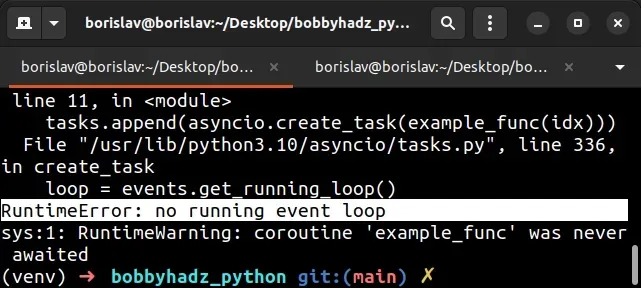
The loop in the example isn't running, so we can't add tasks to it.
We are adding tasks to the event loop and waiting for all of them to finish.
To solve the error, call the create_task method on the created loop object
instead of on the asyncio module.
import asyncio async def example_func(index): print(f'Current index {index}') loop = asyncio.new_event_loop() asyncio.set_event_loop(loop) tasks = [] for idx in range(3): # ✅ Updated this line tasks.append(loop.create_task(example_func(idx))) loop.run_until_complete(asyncio.wait(tasks)) loop.close()
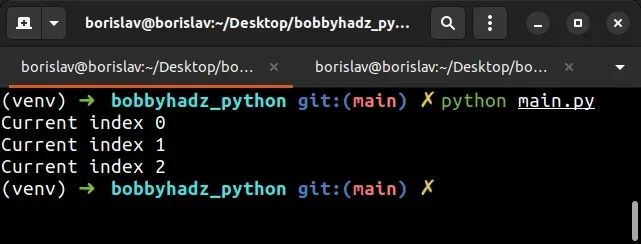
I replaced the following line:
# ⛔️ Incorrect tasks.append(asyncio.create_task(example_func(idx)))
With the following line
# ✅ Correct tasks.append(loop.create_task(example_func(idx)))
Notice that we are now calling the create_task method on the created loop
object and not on the asyncio module.
create_task method on the loop object, you create a task for the specific loop.Conversely, when you call the create_task method on the asyncio module, it
looks for a running event loop and doesn't find one which causes the error.
# Creating the tasks in an async function
You can also solve the error by creating the tasks in an async function.
import asyncio async def example_func(index): print(f'Before {index}') await asyncio.sleep(0.2) print(f'After {index}') loop = asyncio.new_event_loop() asyncio.set_event_loop(loop) async def create_tasks(): tasks = [] for idx in range(3): tasks.append(asyncio.create_task(example_func(idx))) await asyncio.wait(tasks) loop.run_until_complete(create_tasks()) loop.close()
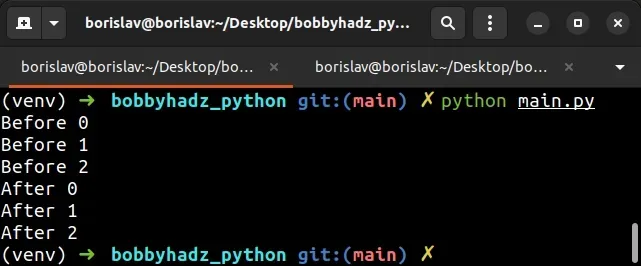
The create_tasks function is also marked as async.
By the time the asyncio.create_task() method is run, the event loop is already
running so asyncio is able to attach tasks to it.
# Calling the get_running_loop method without a running event loop
The "RuntimeError: no running event loop" also occurs when you call the
get_running_loop method without a running event loop.
import asyncio async def example_func(): for idx in range(3): print(idx) await asyncio.sleep(1) # ⛔️ RuntimeError: no running event loop loop = asyncio.get_running_loop() loop.run_until_complete(example_func())
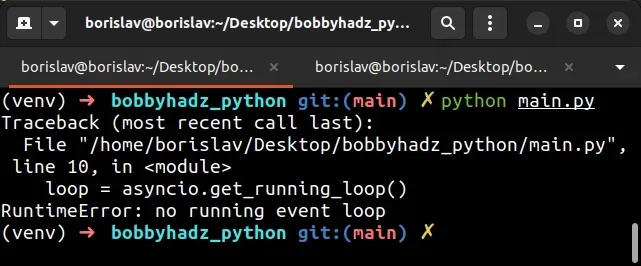
The asyncio.get_running_loop method tries to get a running event loop but
doesn't find one, so a RuntimeError is raised.
To solve the error:
- Use the asyncio.new_event_loop() method to create and return a new event loop object.
- Use the asyncio.set_event_loop() method to set the supplied loop as the current event loop for the current OS thread.
import asyncio async def example_func(): for idx in range(3): print(idx) await asyncio.sleep(1) loop = asyncio.new_event_loop() asyncio.set_event_loop(loop) loop.run_until_complete(example_func())
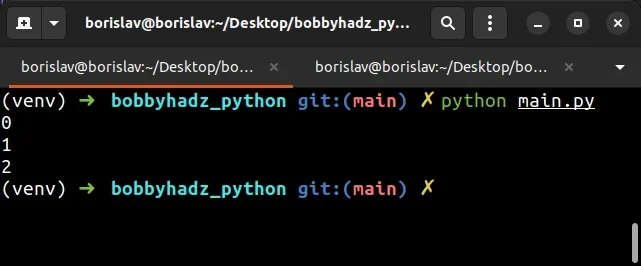
The loop.run_until_complete method runs until the asyncio.Task has completed.
You can use another async function if you need to call the
asyncio.get_running_loop() method.
import asyncio async def example_func(): for idx in range(3): print(idx) await asyncio.sleep(1) async def get_loop(): loop_ = asyncio.get_running_loop() await loop_.create_task(example_func()) loop = asyncio.new_event_loop() asyncio.set_event_loop(loop) loop.run_until_complete(get_loop())
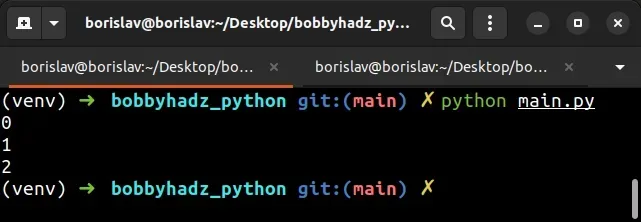
By the time the asyncio.get_running_loop() method runs, there is a running
event loop, so the error is no longer raised.
# Additional Resources
You can learn more about the related topics by checking out the following tutorials:

